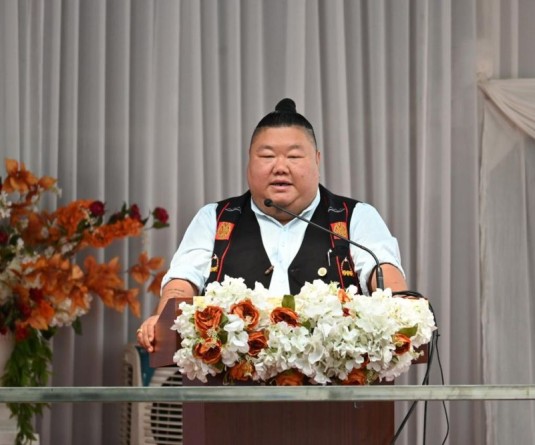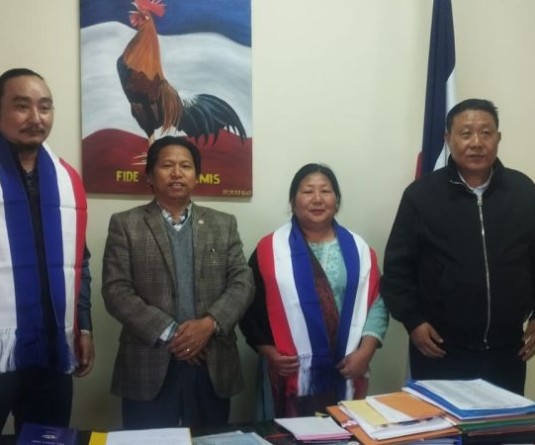
Dimapur, September 4 (MExN): In a bid to create awareness among the youngsters on Environmental Rights, a workshop was conducted today, September 4 at Patkai Christian Autonomous College, Chumukedima. The workshop was organised by the Political Science Department of the college.
Resource persons from Dialogue on Indigenous Culture and Environment (DICE) Foundation enlightened the students on various subjects. Two documentaries were shown – Fever and controversial Annie Leonard’s Story of Stuff.
The Chief Functionary of DICE Foundation Mmhonlumo Kikon said that many a time developmental projects to benefit economy effects people in the grass root level. Citing an example of development induced displacement, he said Kaptai Dam in Bangladesh displaced indigenous people from the Chakma and Hajong tribes who lost their lands and homes.
He also said that each person is responsible for well being of the environment. “We are not just global citizens but ecological citizens too.”
Oil and Environment
Referring to Changpang oil field crisis, Kikon said decisions on developmental projects are made at the top level without consulting the people, thus exploiting the common people.
He also explained on the concept of space and place. Developed countries look at third world countries as space and not as place – a space for them to extract natural resources at the expense of exploiting the ecological balance of that particular environment.
He said that due to ignorance of one’s rights, the landowners were exploited by ONGC and after the intervention of Naga Students’ Federation, the firm stopped drilling oil and a compensation of Rs 33 crores were paid to the state, where 67 lakhs were given to the affected people but it was not evenly distributed. Due to negligence of the company, the oil continues to spill contaminating the environment. Cases have been reported that people living around the area have health complications.
In this regard, Kikon also said a case was filed at Gauhati High Court against ONGC – demanding to clean the oil spill and compensate the people as deserved with a sum of Rs 1000 crores. However, State Government is unhappy about the case.
“Government wants to make money out of other people’s misery.” He also went on saying that if the government wants ONGC to drill the oil again, they have to pay the people per barrel – a barrel cost more than $ 100. He added that if they drill 1000 barrels a day, 12 % of the market price of each barrel should be paid to the people and if 2000 barrels then 14% should be given. Also, the government should implement a “Petroleum Act”, which would protect people’s rights and environment. He also informed that another hearing will be held on September 7 at Gauhati High Court.
Tourism and Environment
Although tourism is a lucrative industry, many do not realise the price being paid for promoting tourism. “Tourism depends on environment; however, environment is vulnerable to tourism,” said Chubasenla Nokdir, Research Associate of DICE Foundation.
She said in the name of tourism, stakeholders say that it benefits the people but in reality, it is only the stakeholders who are benefited at large and not the common people. “Pro-poor tourism more about tourism and less about poor.”
In related to natural resources, she said there is a close link between water scarcity and tourism. With lifting of Restricted Area Permit, the flow of tourist will increase and will gradually have an impact on natural resources of the region. “Tourism is an unregulated industry,” she added.
On culture, she said it does revive one’s culture but at the same time, the meaning is lost. A tribal dance becomes a means of entertainment rather than the age-old tradition passed down from generations.
Nokdir said restrictions and limitations are needed to regulate the industry so that environment and people’s culture are not affected.
Free Trade and Economic Rights in the Northeast
Kim Chishi, Research Associate of Dice Foundation presented an insight on Free Trade Agreement, explaining how it influences an economy. According to IMF, fastest way for a state to be economically developed is FTA. However, the price paid by signing the agreement is expensive since it gives rights to foreign companies to exploit natural resources of a region.
On the most talked about ‘Look East Policy’, she agreed that the region will be exposed to the outside world however, as promised of generating employment may be not fulfilled. The foreign firms have their own labour standards and people in NE region might not fulfil those norms, which will lead the firms to employ people outside from the region.
In the case of exporting indigenous products, she said: “Will our products fulfil the need of the market. Pros and cons of the agreement are not taken into proper considerations.”
On the same subject, Mmhonlumo Kikon said: “Will products of Northeast be sold more in South East Asian countries or Chinese goods flooding our market.” He also added that there are chances that even the traditional shawls would be manufactured in china, which will be cheaper than the authentic hand weaved shawls. He further said that NE will become a transit point or “Transport Hub” and nothing more. “...the concept of development has been badly defined.”





